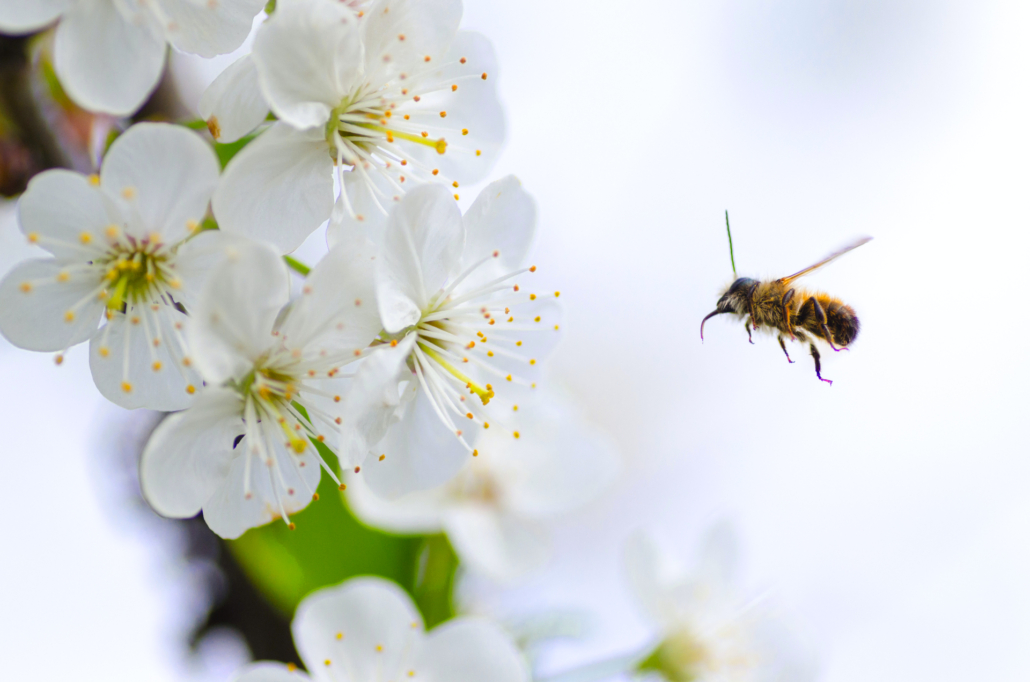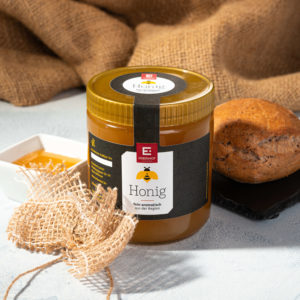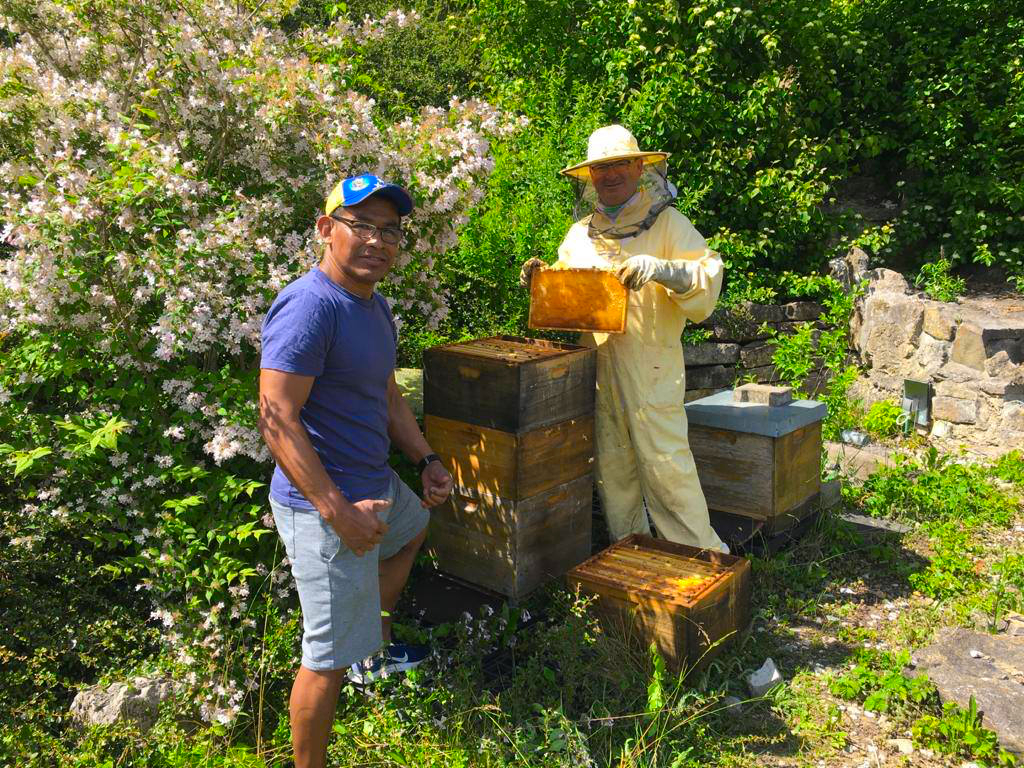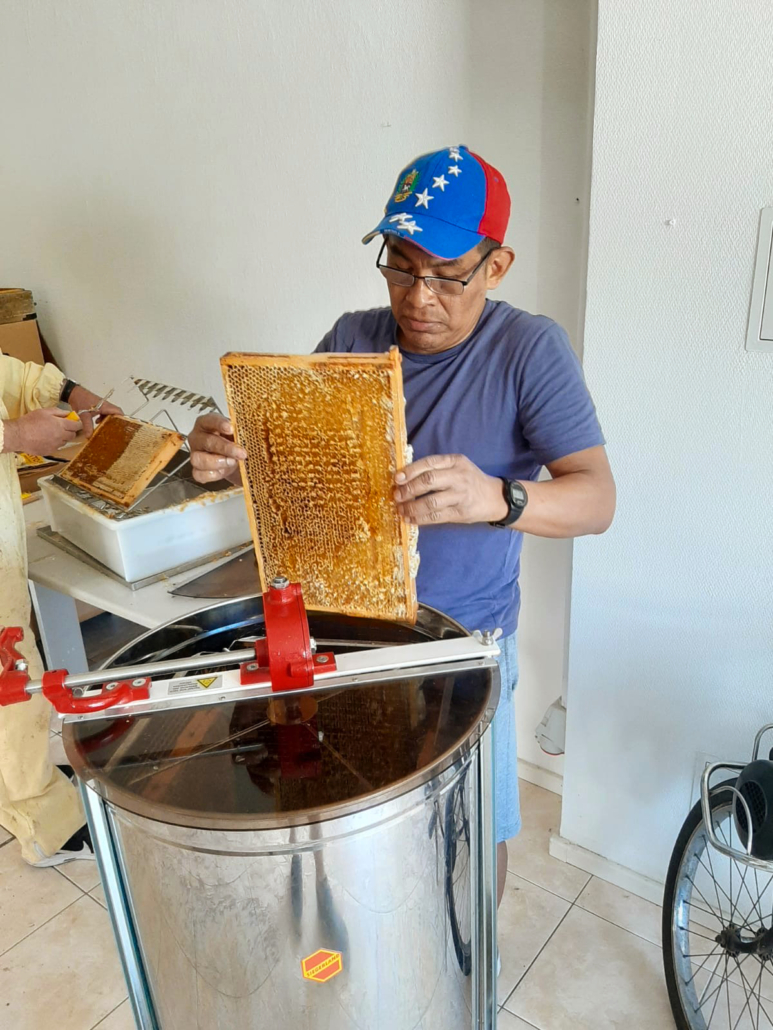Honey from the Thuringian Forest region
The production of honey from Thuringia has a long tradition. Due to the wide meadows and the Thuringian forest, the supply of flower nectar is diverse. Important beekeepers and bee scientists – such as August Ludwig (Jena) or August von Berlepsch (Seebach near Mühlhausen) – originate from Thuringia, from where they significantly shaped international beekeeping.
Also in the Erbenhof we let the tradition of beekeeping live on and produce our own honey. You will find it on our breakfast buffet and in our seasonal dishes. Of course you can also buy the honey from Thuringia as a souvenir at our reception.
❁❁❁ Blossom honey from the region ❁❁❁
Sustainable, delicious and from our own production
Buy a glass or enjoy at breakfast
Sustainable honey from Weimar
With our beekeeping and lamb breeding we would like to support the region around Weimar sustainably. The bee colonies of the restaurant Erbenhof pollinate the free meadows and fields of the surrounding vegetable farmers. But also free heaths and forests are approached, resulting in a wide range of regional honey. Honey varieties can be distinguished depending on the type of nectar.
Thuringian honey varieties
✓ Fruit blossom honey
✓ Rape honey
✓ Dandelion honey
✓ Clover honey
✓ Sunflower honey
✓ Blossom honey
✓ Forest blossom honey
✓ Forest honey
The nectar collected by the bees also determines the character of the honey. While the fruit blossom honey crystallizes quickly and has an intense yellow color, the dark forest honey remains liquid for a long time and tastes spicy. Discover the irresistible Thuringian honey.
The Erbenhof honey from the region is a clear blossom honey with a fine sweet taste. Taste from the in-house apiary – for example, at our extensive breakfast. Or take a jar of Thuringian honey home with you as a Weimar souvenir. At the reception you can purchase the Erbenhof blossom honey.
Honey production
At flowering time, the workers of the bee colony fly to flowering fields and meadows. They collect the nectar of the flower and pollinate the plant in the process. The collected nectar is mixed with a secretion and enclosed as a nutrient store in the typical hexagonal honeycombs. These are located in so-called hives of our apiary.
At the end of spring it becomes exciting: the honey is harvested and processed at the end of May.
Steps of honey extraction:
To extract the valuable honey from Thuringia, the hives are removed from the hive and first the honeycomb lid is removed. With the help of centrifugal force, the liquid, still slightly warm honey is separated from the comb during centrifuging. Small residues of wax and foam are removed. Subsequently, the otherwise untreated honey is bottled and the cooling process slowly sets in crystallization.
Use of Erbenhof honey
The resulting natural product is considered a raw food, since no heat is added in the processing: the spinning temperature corresponds to the hive heat of the swarm of bees. The Erbenhof apiary also avoids the use of additives.
Thuringian honey as food
Aufgrund der hohen Konzentration der Zweifachzucker Fructose (Fruchtzucker) und Glukose (Traubenzucker) von bis zu 75 Prozent hat unser Erbenhof Honig einen hohen Süßungsgrad. Der Honig ist daher ein beliebtes Süßungsmittel. Unser Honig aus der Region dient außerdem als Brotaufstrich zum Frühstück und kann als kleines nachhaltiges Souvenir an der Rezeption erstanden werden.
Due to the high concentration of the dual sugars fructose (fruit sugar) and glucose (grape sugar) of up to 75 percent, our Erbenhof honey has a high degree of sweetening. Honey is therefore a popular sweetener. Our honey from the region also serves as a spread for breakfast and can be purchased as a small sustainable souvenir at the reception.
Thuringian honey from a medical point of view
In addition to the great flavors, the regional Thuringian honey also has medicinal functions: the antiseptic effect of honey and honeycomb can be used for various infections.
Because of the high content of vitamins – such as B1, B2, B6, C and H – and minerals such as potassium, calcium, magnesium and others, the honey from Thuringia enjoys great popularity. The regional honey is also a sweet source of protein, as it contains, for example, the essential amino acids leucine, phenylalanine and histidine.






